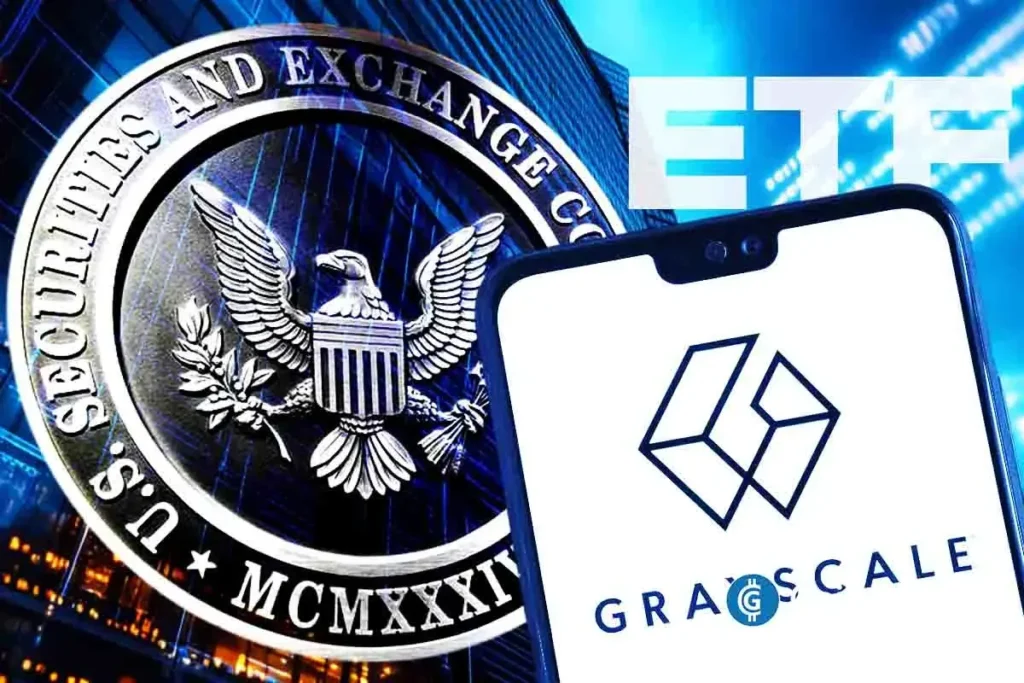Grayscale’s ETF Plans: A New Era for Litecoin, Hedera, and Bitcoin Cash
Grayscale Investments, a prominent player in the cryptocurrency investment landscape, has recently made headlines by filing registration statements for multiple exchange-traded funds (ETFs) targeting Litecoin (LTC), Hedera (HBAR), and Bitcoin Cash (BCH). This strategic move not only highlights Grayscale’s commitment to expanding its product offerings but also underscores the growing interest in spot exposure to various cryptocurrencies among retail and institutional investors. Notably, the filing for the Bitcoin Cash ETF represents a significant milestone, being the first of its kind in the market.
Grayscale Files for the First Bitcoin Cash ETF
Grayscale’s recent filing with the U.S. Securities and Exchange Commission (SEC) involves the conversion of its existing Bitcoin Cash Trust into an ETF. This groundbreaking move aims to enhance accessibility for investors looking to profit from BCH’s price movements. The planned ETF will be listed on NYSE Arca, with the Bank of New York Mellon set to serve as the Trust’s administrator, while Coinbase will manage its brokerage and custody services. By aligning the Bitcoin Cash ETF with the SEC’s proposed Generic Listing Standards, Grayscale is positioning itself to promote the fund once these standards gain regulatory approval.
The confidence exhibited by Grayscale in pursuing this ETF filing is indicative of a shifting landscape in the cryptocurrency market, especially as the demand for regulated investment vehicles continues to rise. With pending applications for LTC and HBAR ETFs from other fund issuers, the market’s appetite for diverse crypto investment options is evident.
Converting Trusts: Grayscale’s Approach to Litecoin and Chainlink
In addition to the Bitcoin Cash ETF, Grayscale has filed an S-3 form to transform its Litecoin Trust into an ETF as well. Much like the BCH filing, this Litecoin ETF will also seek a listing on NYSE Arca, pending SEC approval of the Generic Listing Standards. With Litecoin being a well-established cryptocurrency, this move could open up new avenues for both retail and institutional investors by offering a regulated investment option that mirrors LTC’s market performance.
Interestingly, Grayscale’s reforms do not end with Litecoin and Bitcoin Cash. The asset manager also submitted a similar S-3 form for its Chainlink Trust, aiming for ETF conversion. This cohesive strategy underscores Grayscale’s broader vision of enabling investors to gain spot exposure to multiple crypto assets within a structured regulatory framework.
Grayscale’s Unique Hedera ETF Filing
Unlike its approach for Bitcoin Cash and Litecoin, Grayscale took a different route for its Hedera ETF by filing an S-1 form. This distinction is noteworthy and reflects the unique circumstances surrounding the Hedera asset. While Grayscale does not have a closed-end fund for Hedera to convert into an ETF, Nasdaq has already filed a 19b-4 application to list and trade the shares of this fund.
The SEC has yet to reach a decision regarding the proposed rule change to list the Grayscale Hedera ETF. However, there is a deadline looming, with the SEC required to make a decision by November 12. Interestingly, another issuer, Canary, has its final deadline for its Hedera ETF on November 8, raising the possibility of simultaneous approval for both funds. Such approvals would mark a significant advancement in the adoption of cryptocurrency-based investment vehicles.
Regulatory Landscape and Future Implications
The ongoing developments in Grayscale’s filings highlight the evolving regulatory landscape surrounding cryptocurrency investment products. The SEC’s eventual acceptance of the proposed Generic Listing Standards could pave the way for a surge in ETF approvals, potentially ushering in a new era of crypto investment options. Retail and institutional investors alike are eagerly awaiting these developments, as they represent a shift toward greater regulatory clarity, which can foster more trust in the cryptocurrency market.
Grayscale’s strategic timing and alignment with SEC requirements indicate a careful approach designed to maximize approval chances for its proposed funds. By waiting for the SEC’s decisions on Generic Listing Standards, Grayscale aims to ensure compliance and stability in its offerings, which can attract a diverse range of investors.
The Broader Impact of Grayscale’s ETF Ventures
As Grayscale moves to establish these crypto ETFs, the broader implications for the cryptocurrency market are profound. ETFs serve as accessible investment vehicles, making it easier for both retail and institutional investors to gain exposure to digital assets without needing to navigate the complexities of direct ownership. The potential approval of these ETFs may lead to increased institutional investments, which could foster higher liquidity and price stability in the ever-vibrant crypto market.
Moreover, the introduction of new ETFs could ignite a competitive landscape among asset managers, each vying for investor attention. This burgeoning competition is likely to drive innovation and improve the quality of services provided to investors, enhancing the overall investment experience in the cryptocurrency market.
Conclusion
Grayscale’s recent filings for Litecoin, Hedera, and Bitcoin Cash ETFs signal a pivotal moment in the cryptocurrency investment landscape. By seeking to convert existing trusts into ETFs, Grayscale is not only expanding its portfolio but also aiming to meet the growing demand for regulated investment options in the digital asset space. The developments surrounding the SEC’s proposed Generic Listing Standards could significantly impact the approval timelines for various crypto ETFs, thereby shaping investment strategies for a wide array of investors. As the regulatory landscape continues to evolve, the anticipation surrounding these ETFs illustrates a burgeoning confidence in the future of cryptocurrencies as viable investment assets.


